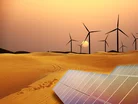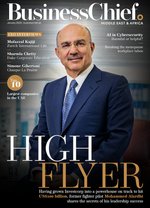Top 10 GCC companies pioneering in the sustainability space

While the Gulf nations are major oil and gas producers, they are increasingly playing a significant role in supporting global efforts to achieve net-zero with five of the six GCC states (Bahrain, Oman, Kuwait, Saudi and the UAE) committed to achieving net-zero targets.
Many too, the UAE and Saudi especially, have made significant strides in rolling out low-carbon energy investments and initiatives and there are clear signs that financial institutions are increasingly participating in financing sustainable and climate-friendly projects.
The region’s sovereign wealth funds have been a key part of efforts to support green investments, while government-backed megaprojects like Saudi’s NEOM and Abu Dhabi’s Masdar City are paving the way for truly sustainable living.
And so, in this Year of Sustainability for the UAE and in the run-up to COP28, which takes place in the UAE in Nov/Dec 2023, we pay tribute to ten GCC-based companies spearheading change regionally and pioneering solutions to help shape a more sustainable world.
1. Beeah Group
Founded: 2007
HQ: Sharjah, UAE
Group CEO: Khaled Al Huraimel
Established in 2007 to address the region’s environmental challenges, Beeah Group has since restructured into an investment holding group launching new business verticals to deliver sustainable, digital solutions that shape future cities.
Now considered the region’s leading sustainability pioneer, Beeah delivers smart solutions for waste collection, city cleaning (Beeah Tandeef), waste processing and material recovery (Beeah Recycling), clean, renewable power (Beeah Energy), green mobility (Beeah Transport), and awareness (Beeah Education).
At Tandeef, vehicles are all tracked, and the routing optimised by AI, while its commercial and industrial recycling facility has an AI-powered robot that segregates waste by type.
Beeah’s HQ in Sharjah, home to more than 10,000 employees, reflects its ambitions. As one of the smartest and most sustainable buildings regionally, it is equipped to operate at LEED Platinum standards and is 100% powered by renewable energy.
Along with Masdar, Beeah is building the UAE’s first waste-to-energy facility, set to divert more than 300,000 tons of non-recyclable waste from landfills annually and generate enough clean energy to power 30,000 homes. Beeah is also working with ISWA and Roland Berger to create a blockchain-powered global standard for waste recycling and building the nation’s first recycling plant for end-of-life EV batteries.
Innovation and education take centre stage too, thanks largely to Beeah’s environmental arm for consulting, research and innovation, and its sustainability academy, which reaches 700 schools and offers green careers.
2. Masdar
Founded: 2006
HQ: Abu Dhabi
Throughout its 17-year history, Masdar has proven to be a pioneering force for sustainable change, driving the energy transition through investment in a diverse portfolio, from solar power in Abu Dhabi to offshore wind in the UK.
Operational in more than 30 countries, Masdar is on track to become one of the world’s largest renewable energy firms by 2030. Having nearly doubled its clean energy capacity and CO2 displacement (10 million tonnes in 2022) in just two years, it is now on track to grow clean energy capacity from above 20GW to 100GW and 1 million tonnes per year of green hydrogen production by 2030.
The company, which is wholly owned by the Abu Dhabi government’s investment arm Mubadala, is working with Beeah to launch the first commercial scale waste-to-energy project regionally; working on the world’s largest single-site solar power plant in Al Dhafra and Africa’s biggest wind farm in Egypt; and constructing a blueprint for future cities.
Having recently developed a Green Finance Framework to guide all future financing activities, Masdar plans to become an issuer of Green Bonds in the debt capital markets.
3. Averda
Founded: 1964
HQ: Dubai
CEO: Mazen Chebaklo
As the leading end-to-end waste management, treatment and recycling company in the emerging world, with 60,000 clients across MEA and India, Averda has been keeping cities and the environment clean for 30+ years.
Long-time advocates of the circular economy, Averda is on a mission to treat, recover and recycle over 80% of its waste using sustainable solutions. In partnership with WasteFuel, the company is developing the first commercial-scale municipal waste to renewable methanol plant regionally, turning unrecyclable waste into low-carbon fuel to help shipping companies achieve up to 90% CO2 emission reductions.
Operationally, Averda has employed a route optimisation solution, halved energy consumption at its South African plant, and introduced an Environment Management system to monitor, benchmark, and set targets.
4. Red Sea Global
Founded: 2018
HQ: Riyadh, KSA
CEO: John Pagano
As the visionary multi-project developer behind two of the world’s most ambitious regenerative tourism destinations – The Red Sea and Amaala – Saudi-based Red Sea Global (RSG) is not just building a destination but laying the foundations for a new way of thinking about a more sustainable future.
Led by a zero-carbon strategy and the first development in the Middle East to secure LEED Cities Platinum certification, RSG is setting new standards for sustainability – protecting the natural habitat while taking steps to enhance it. The developer has pledged to achieve a 30% net conservation benefit by 2040, and is farming corals and planting mangrove trees.
Powered by 100% renewable energy, the 10,000sqm Red Sea site will generate zero waste to landfill and feature Saudi’s first carbon-neutral electric buses.
5. First Abu Dhabi Bank (FAB)
Founded: 2017
HQ: Abu Dhabi, UAE
Group CEO: Hana Al Rostamani
The UAE’s largest bank and the Middle East’s best bank for sustainable finance in 2023, according to Euromoney, FAB is a pioneer in driving growth in ESG finance – the first bank regionally to issue a green bond, FAB has now issued six.
FAB topped the sustainable bonds and loans bookrunner league table in the Middle East in 2022, with 13 transactions totalling US$1.64 billion and an 8.39% market share. The bank further facilitated more than US$9 billion worth of sustainable projects with more than half of its bond issuances in a green format.
This builds on the lender’s commitment to invest more than US$75 billion in sustainable initiatives by 2030. FAB is committed to helping its clients align their ESG strategy with their funding strategy.
6. Diamond Developers
Founded: 2003
HQ: Dubai
CEO Salah Habib
Faced with a tanking of the Dubai real estate sector in 2008, Diamond Developers refocused operations on sustainability with a vision to create a sustainable net-zero neighbourhood. The Sustainable City Dubai is Diamond’s first and flagship operational net-zero energy city and has become globally recognised as an example of successful, sustainable real estate development.
Considered experts in the creation and management of sustainable, intelligent, live-work-and-thrive cities, Diamond is now building three more sustainable communities – Sharjah (UAE), Yiti (Oman) and Yas Island.
Partnered with Aldar, The Sustainable City Yas Island will be a low-emissions green community powered by clean renewable energy, including solar panels in parking structures, recycling facilities, community farming plots, and battery-charged bikes. The first phase was sold out within 24 hours.
7. ACWA Power
Founded: 2004
HQ: Riyadh, KSA
CEO: Marco Arcelli
PIF-backed ACWA Power is a leading and pioneering Saudi developer, investor, and operator of power generation, water desalination and green hydrogen plants worldwide. Since 2004, the firm has pivoted from conventional power/water towards a low-carbon portfolio of 77 projects in 12 countries with an investment value of US$78.2 billion – 86% of assets utilise low-carbon technologies for power generation.
Among those projects, ACWA is powering phase one of The Red Sea project, the region’s first tourism destination to be fuelled by renewable energy (see above), and leading the region’s green hydrogen and renewable energy transformation, with participation in the NEOM Green Hydrogen Project, the world’s largest utility-scale, commercially-based hydrogen facility powered by renewable energy.
8. Aster DM Healthcare
Founded: 1987
HQ: Dubai
Chairman / MD: Dr Azad Moopen
As one of the largest integrated healthcare providers in the GCC and India, Aster boasts the highest level of ESG rating, having integrated 11 UN SDGs into its ESG policies. The Group, which has 697 facilities across seven countries, and employs a diverse workforce of 27,200, is the only listed company to feature in Corporate Knights Global 100 – ranked the world’s 94th most sustainable company – and has secured many awards for CSR and community initiatives.
Among sustainability efforts, Aster is rolling out renewable energy across its hospitals and recycling water, while its award-winning CSR project Aster Volunteers has touched the lives of more than 4 million people, including organising the world’s largest-ever free diabetes screening camp for low-income workers.
9. Tadweer
Founded: 2004
HQ: Abu Dhabi
CEO: Ali Al Dhaheri
The Abu Dhabi Waste Management Centre, Tadweer, has established its position as a pioneer in waste management – using state-of-the-art technology to provide partners with sustainable solutions. Recently, the company launched the region’s first 100% electric waste-collection truck, as it looks to set the stage for EV adoption.
Part of holding company ADQ, Tadweer is increasingly working with partners to pioneer ways to extract value through recycling and reuse of waste, most recently collaborating with Masdar, bp, ADNOC and Emirates to explore the production of SAF (sustainable aviation fuel) and other renewable fuel solutions including diesel and hydrogen.
10. Enerwhere
Founded: 2017
HQ: Dubai
CEO: Alice Cowman
As the world’s first distributed solar utility company, with 30 operating micro-grids across the Middle East, Enerwhere powers commercial, industry customers, from oil/gas to hospitality, with solar hybrid solutions. One of the early pioneers of using renewable energy in the temporary power sector, Enerwhere built its first off-grid solar plant in the UAE in 2014 when everything else was still running on 100% diesel.
What distinguishes Enerwhere from other solar companies is taking responsibility for the client’s entire power supply, not just solar. Landmark projects include the world’s largest solar-powered construction site in JLT, the first ultra-mobile solar plant for the oil and gas industry in Oman, and a solar plant to power Abu Dhabi’s 5-star Zaya Nurai Island resort, the region’s first near-shore open sea floating structure.
Featured Articles
SAP has announced it has appointed a new President for a newly-created EMEA region, aiming to make the most of the opportunities of cloud and AI
technology
From fighter pilot to fashion house financier, Mohammed Alardhi has taken Investcorp to great heights – so what’s the secret to his success?
Dr Omar Al-Attas, Head of Environmental Protection and Regeneration at Red Sea Global, shares his COP28 hopes and approach to regenerative tourism
strategy







